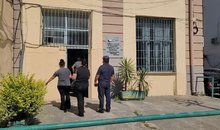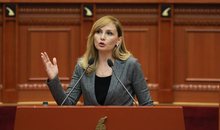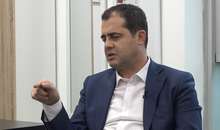
 Flash News
Flash News
The euro falls below 120 lek, the lowest historical level. The Conference League final is expected to bring further decline

The euro fell today for the first time below the limit of 120 Lekë, marking the lowest historical level in the exchange rate.
According to the official exchange rate of the Bank of Albania, the Euro was exchanged on Friday at 119.96 Lekë, touching a new record in a depreciation cycle that, with small breaks, had started last year.
Foreign exchange market agents say that the demand for Euro remains low, while in this period inflows have improved significantly thanks to increased exports and inbound tourism.
Another factor that has probably started to affect the exchange rate between the Euro and the Lek is the final of the Conference League, which will take place in Tirana next week. At least 20,000 foreign fans are expected to enter the country for this event, who will bring large sums of foreign currency with them.
Market agents think the match will have an inevitable effect on the foreign exchange market. The Albanian foreign exchange market is relatively small and inflows in the order of several million Euros concentrated in a few days, will increase the supply of the Euro and will further devalue the European currency against the Lek.
It is very likely that next week the Euro will touch new declining records in the exchange rate with the Lek.
Even further, the fact that we are before the summer season makes the expectations to be mainly in favor of a further appreciation of the Lek in the exchange rate against the Euro.
This appreciation of the Lek for most experts has been unexpected, given the rise in prices and the widening trade deficit, especially starting from the last quarter of last year. But even the increase in imports has not devalued the Lek.
Experts think that the wave of panic that swept the economy after the outbreak of war in Ukraine caused many people to create stocks of consumer food products. This may have somewhat reduced the flow of imports in recent weeks.
Also, electricity imports in recent months are believed to have been in lower quantities, another factor that has further softened the demand for Euro in the foreign exchange market.
The appreciation of the Lek in the exchange rate in this period can help the Albanian economy to absorb the high inflationary pressures coming from imports. According to the Bank of Albania, the strong Lek has somewhat mitigated these pressures and in the absence of local currency appreciation, inflation would probably be higher than the last level of 6.2% reported by INSTAT.
Consumers generally benefit from the strengthening of the Lek in this inflationary period, as do borrowers who have liabilities to repay in European currency. Those who lose from the strengthening of the Lek are mainly the exporting sectors of goods and services in the economy.
Meanwhile, the Lek closed this week by strengthening it in exchange rates with other currencies exchanged in the Albanian market. This strengthening is not related to internal factors, but simply reflects the performance of the exchange rate of other currencies against the Euro. Even the strengthening against the currencies of trading partners and mainly against the US Dollar has a mitigating effect in conveying the inflationary pressures coming from imports. Monitor
Latest news




Media: Iran tried to shoot down Trump's plane during the election campaign
2025-06-16 22:04:15
Netanyahu: Eliminating Khamenei would end the conflict with Iran
2025-06-16 21:47:13
Lala: If the Supreme Court acquits Veliaj, a precedent will be created
2025-06-16 21:34:12

Laura Fazliu wins bronze medal at the World Judo Championships
2025-06-16 21:13:32

Car falls off bridge on Saranda-Delvina road, driver injured
2025-06-16 20:58:56
Tourist from Slovakia drowns near the Rock of Kavaja
2025-06-16 20:33:42

Cases of residential burglaries increase significantly during the summer
2025-06-16 20:19:28
Can Trump convince Netanyahu to stop attacking Iran?
2025-06-16 20:17:52
UN financial crisis puts aid for refugees at risk
2025-06-16 19:59:17


Tirana/ 253 complaints for road violations in just one week
2025-06-16 19:24:59


More and more armed drones over the Balkans and no one is watching them
2025-06-16 18:41:28
Korça/ Car goes off the road, woman and two children end up in hospital
2025-06-16 18:25:01
Video/ Iran's state television attacked 'live'
2025-06-16 18:06:21



KPA upholds dismissal of Vlora prosecutor
2025-06-16 17:16:43
The CEC begins the vote recount for four districts tomorrow
2025-06-16 17:08:19

Albanian Railways cuts 47 jobs, maintenance workers affected
2025-06-16 16:43:32
Foods to avoid after 40 for your health
2025-06-16 16:28:08
Albania stands by Israel: Iran must stop nuclear activity
2025-06-16 16:09:08
Two foreign citizens arrested in Dhërmi for selling narcotics
2025-06-16 16:07:54

Transporting illegal immigrants, 24-year-old arrested in Saranda
2025-06-16 15:42:05

NAME/ Elderly man found dead inside a cave in Lezha
2025-06-16 15:15:08


Britain appoints first woman to head intelligence service
2025-06-16 14:49:36


"Passive majority"/ Tabaku: SP has no political will to advance integration!
2025-06-16 14:12:34


Bardhi clashes with Spiropali: Close the Parliament to have lunch in Greece
2025-06-16 13:34:02

Accused of murder, Europol searching for Albanian criminal (NAME)
2025-06-16 13:06:17





"Karma finds its way", to whom is Veliaj's coded message from prison addressed?
2025-06-16 11:59:34
Tragic in Italy! Train hits and kills 19-year-old Italian-Albanian
2025-06-16 11:50:50
Map of towers: How the government is brutally rewriting Tirana
2025-06-16 11:37:09


Earthquake hits northern Macedonia, tremors felt in Albania
2025-06-16 11:00:48
Spahia: Two mandates in Shkodra were stolen from the DP
2025-06-16 10:31:58
"Partizani" file/ Berisha does not appear in SPAK for health reasons
2025-06-16 10:26:43

Belgian tourist injured in Gjipe, boat driver arrested
2025-06-16 10:01:03
NAME/ Drug dealer arrested in Vlora
2025-06-16 09:47:10



Attacks on Iran/DW: German policy in the Middle East under pressure!
2025-06-16 09:15:05
Von der Leyen: Iran must not have nuclear weapons
2025-06-16 09:06:17


Labor market alarm, Albanian workers' skills are 37% of those in the EU
2025-06-16 08:34:47
The Assembly meets in plenary session today, what is expected to be discussed
2025-06-16 08:25:30
35-year-old man shoots himself with a gun in Vlora, sent to 'Trauma'
2025-06-16 08:11:58
Mot i kthjellët në të gjithë vendin, ja parashikimi për këtë të hënë
2025-06-16 07:57:23
Posta e mëngjesit/ Me 2 rreshta: Çfarë pati rëndësi dje në Shqipëri
2025-06-16 07:44:49

Trump vetoes Israeli plan to assassinate Iran's supreme leader
2025-06-15 21:38:01
Vote recount in Tirana, Këlliçi: We want Alimehmet's mandate
2025-06-15 21:17:41
Erdogan calls Trump: We are ready to mediate for Iran
2025-06-15 20:55:34

Netanyahu says he attacked Iran to prevent 'nuclear holocaust'
2025-06-15 20:02:04
Migrant agreements: What benefits Kosovo and why are they criticized?
2025-06-15 19:43:08
Gjirokastër/ Fire burns three hectares of grass near the Kardhiqi Bridge
2025-06-15 19:22:34

Gattuso appointed new Italy national team coach
2025-06-15 18:34:17
Over 400 people have been killed so far in Israeli attacks on Iran
2025-06-15 18:15:47
Trump warns of return to Kosovo-Serbia issue: Biden damaged it
2025-06-15 17:46:52
Bylykbashi: Current electoral system is toxic
2025-06-15 17:25:20
Trump vows for Iran-Israel deal, mentions Kosovo case with Serbia
2025-06-15 16:59:02
German tourist injured on Gjipesa beach, hit by a dinghy's propeller
2025-06-15 16:40:31

Iran attacks Israel with ballistic missiles
2025-06-15 15:48:49
Fecal beach in Durrës, the other side of the tourist miracle
2025-06-15 15:30:57
The attempt to constitute the Assembly in Kosovo fails again
2025-06-15 14:59:10
Ish-presidentit francez Sarkozy i hiqet medalja e Legjionit të Nderit
2025-06-15 14:58:46
Shkodra, with the highest population contraction after the Census
2025-06-15 14:31:47

Caused a fatal accident and left the scene, 35-year-old arrested in Lezha
2025-06-15 13:40:10
